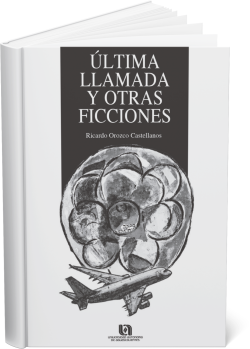Last call and other fictions
Keywords:
Fiction, Short stories, Short tales, Micro-stories, Narratives, Reelaboration of the pastSynopsis
This volume brings together a diverse collection of texts. All of them deserve to be classified as short stories, although some, due to their brevity and laconic style, seem to fall outside the box. The shortest ones were written in an effort to experiment and perhaps as a result of the author's limited time, before 2020, to sit down calmly and draft longer stories or those with a complex structure.
Very short stories, now commonly referred to as microfiction, impose a somewhat unique discipline on authors: they must evoke an event, recount a detail, or create a rarefied atmosphere. They are a provocative genre because they seek to surprise the reader. To use a boxing metaphor that is very apt, they consist of a jab to the face, a quick and precise blow that leaves virtually no room for response. However, there is clearly a risk involved, because not all of us are Augusto Monterroso, nor do we all possess that genius, and therefore we can fall into insubstantial stylistic revelry, so that the effect on our readers is one of ineffectiveness, repetition, or confusion. The shortest texts in the book before you run that risk.
This does not mean, of course, that some of these texts lack literary merit: readers' judgment may or may not benefit them, as we shall see. Nor does it mean that the most elaborate, longest, and most complex stories have a kind of safe conduct or license to do as they please because of their craftsmanship. A long text can always tempt fate, it can become boring or arouse obvious disinterest in readers if it does not tell its story well or if the unexpected twists and turns in the plot surprise no one. Therein lies the challenge faced by those who devote themselves to the arduous task of storytelling, as exciting as it is uncertain in its results.
The stories span a broad time frame, roughly from 2014 to 2024, ten years during which the author conceived, wrote, and published most of his other books. Almost all of the shorter stories were written during the period when Orozco was teaching or working as an academic administrator at the university. Others, also short, correspond to more recent times when he has taken to experimenting again with narrative forms, something he cannot easily escape, as the ever-perceptive reader will note.
Narratives are presented as opportunities to rework the past; doing so in the form of a short story—which refers at most to a few events, usually strange, not necessarily extraordinary, at least unusual—allows us to invent and reinvent our own lives and those of others. In short, it is a matter of imagining the past as if it were a future, under an improbable but fascinating premise: what would this or that event have been like if we had experienced it today or just yesterday? How is it that our lives have taken so many turns that they have become incomprehensible to us? This is how Orozco would like these stories to be read, as a question rather than an impossible answer.

Downloads
Published
Series
Categories
License

This work is licensed under a Creative Commons Attribution-ShareAlike 4.0 International License.






